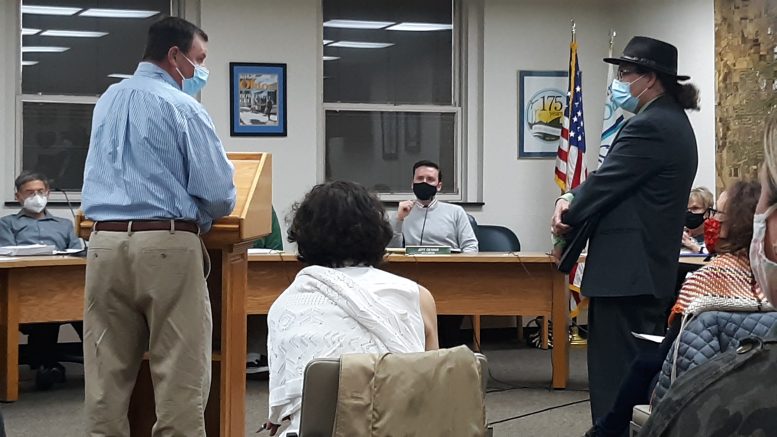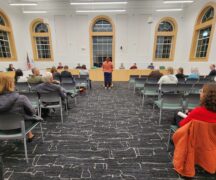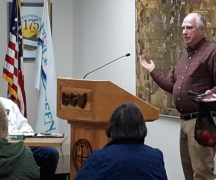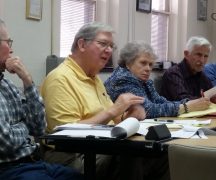By JAN LARSON McLAUGHLIN
BG Independent News
Joe DeMare was back before Bowling Green City Council Monday evening to shine light on a new policy he says will discourage rooftop solar systems in the city. But his presentation was once again clouded by his attacks on the character of the city’s utilities director.
DeMare’s accusations spurred Mayor Mike Aspacher to go to the podium to respond.
“I just want to refute a couple comments made by Mr. DeMare,” the mayor said. “This is at least the third public meeting where you have come before an elected body or an appointed body and questioned the character, integrity and honesty of Mr. (Brian) O’Connell – and frankly, that’s offensive.”
“You may not like the results of Mr. O’Connell’s research,” Aspacher continued. “Public debate, discussion of policies are part of our democracy. It’s important. But so is the truth. So I’m going to ask you from this point on to stick to the truth.”
The mayor pointed out that DeMare was wrong in his assertion that O’Connell made the decision to enter into an agreement with Prairie State coal plant. O’Connell was city engineer at the point – not part of the city utilities department.
At one point, DeMare interrupted Aspacher as he was speaking.
“I’ve made a request for you to be civil and speak the truth,” the mayor said.
“I have been striving to be as accurate as possible,” DeMare said, adding that the numbers speak for themselves.
The new rooftop solar policy objected to by DeMare was approved by the city’s Board of Public Utilities in October, and is scheduled to go into effect in July.
The new policy reduces the payback for residents who install rooftop solar systems and sell excess power back to the city. Under the new plan, the city would pay 5.5 cents per excess kilowatt hour, then sell it for 12.5 cents, DeMare said.
He referred to it as “an obscene profit by any measure.”
The new policy also charges fees of $1 a month per kilowatt capacity. That will start out at $6 per month for a system like DeMare’s which produces six kilowatts. The fee will increase $1 annually, until it reaches the ceiling of $4 per kilowatt capacity – or $24 a month for DeMare.
According to DeMare, the new fees would mean it would take 60 years to pay off his investment in his solar panels.
City Council has already told DeMare that the rooftop solar policy was set by the board of public utilities – not by council. But DeMare told council Monday evening that the utilities board was not receptive to his request for changes.
“They did not pay any attention to the facts brought forward,” he said. “They ignored the obvious facts.”
So, DeMare asked City Council to send a letter to the utilities board asking for an explanation of the new policy. He praised the city’s efforts to use green energy – but cautioned that the work must continue.
“Bowling Green has been a leader in the solar energy field,” but the new policy will discourage rooftop solar, he said.
Some on council appeared sympathetic to rooftop solar concerns, and interested in the numbers presented by DeMare. But some were put off by his accusatory approach.
During a February meeting, DeMare made comparisons to the scandalous House Bill 6, and in an April meeting, he referenced Greta Thunberg, the young Swedish environmental activist, who pointed out many world leaders “saying the right thing, but doing the wrong thing.”
Council member Sandy Rowland said O’Connell has followed up with answers to council’s questions. She pointed out that the fees are intended to make sure other electric customers in the city aren’t subsidizing those who choose to install rooftop solar panels.
Council member Jeff Dennis asked DeMare to put aside the personal attacks and send evidence of inaccuracies if he has them.
“I do think you are making several good points,” Dennis said.
Council member John Zanfardino said the new policy is “truly disappointing” and appears to discourage rooftop solar.
“We have created a disincentive to not burden the many” regular electric customers for the handful of rooftop solar systems in the city, he said. “This is a true discouragement to solar panels in Bowling Green.”
Both Dennis and Zanfardino suggested the city perhaps consider incentives for rooftop solar systems to negate the impact of the new policy.
O’Connell was not present at Monday’s meeting, since most city officials are asked not to attend due to COVID space restrictions. He has stressed that Bowling Green is committed to solar energy – evidenced by the largest municipal-owned solar field in the state, located east of the city.
“We are not against renewable energy,” O’Connell said earlier this year. “But there’s also a financial obligation to make sure the system is kept whole.”





